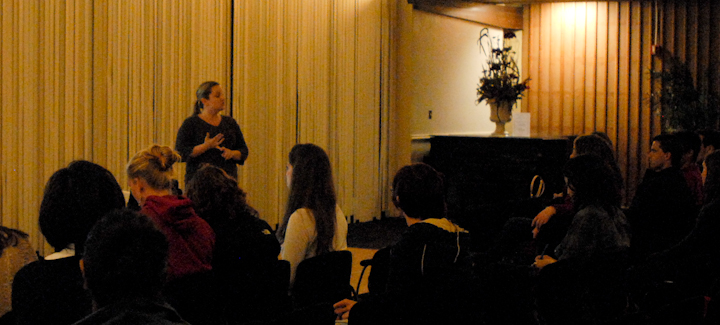
Faculty Senate action on the Alternative Review Process (ARP) cannot be taken until the ASSU legislative bodies pass a bill on it, University officials confirmed Wednesday.
About 50 undergraduate students attended Wednesday’s town hall on the ARP, the second of two sessions co-hosted by the ASSU Executive and the Office of Community Standards (OCS), which oversees ARP proceedings.
Senior University Counsel Lauren Schoenthaler also confirmed that the ARP was currently operating on University President John Hennessy’s power to intervene in judicial affairs in “extraordinary circumstances.” However, she maintained that although the ARP does violate the rights-of-the-accused provision of the ASSU Constitution, any contract is unenforceable if the contract violates federal law. The University has interpreted a failure to extend the ARP as a violation of the Dear Colleague letter, thus making the constitutional provision unenforceable.
“We’re compelled by law to [disregard the ASSU Constitution],” Schoenthaler said. “Actually, I would turn the question around and say ‘Gosh, ASSU, aren’t you worried that the federal government is going to come talk to you about the fact that your constitution conflicts with Title IX?'”
Both forums were entirely informational; beyond what was implied by the intonation of questions, no student directly expressed an opinion about any of the ARP’s provisions.
“It was a very educational night, and I think that was the right way to go,” ASSU President Robbie Zimbroff ’12 said. “I’m glad it didn’t turn into strictly voicing whatever opinion you came in the room with, because I think there were a lot of questions that might have helped people form more informed opinions.”
Only one graduate student who was not affiliated with ASSU legislative bodies attended the graduate community forum on Tuesday. Also in attendance were three representatives from the University, one member of the Graduate Student Council (GSC) and three representatives from the ASSU Executive. The forum lasted 20 minutes.
“I think graduate [students] are generally harder to get to a physical location,” Zimbroff said. “Graduate representatives were telling me … [that] we can do a better job soliciting input by email, which we will do.”
Wednesday’s undergraduate forum lasted for well over an hour, featuring a full presentation about the ARP by OCS Associate Director Jamie Pontius-Hogan.
Pontius-Hogan confirmed that the ARP will continue in its current form until it is approved or rejected by the Faculty Senate. However, the Undergraduate Senate and GSC must pass a bill on ARP before it can be submitted to the Faculty Senate for review. Last year’s Undergraduate Senate deferred their decision to this year’s senators, who have in turn delayed discussions until after this week’s town halls.
When a student asked what would happen if the Faculty Senate rejects the ARP, Pontius-Hogan said she “wasn’t prepared to answer that question yet.”
Previously, Zimbroff had stated that he hoped the town halls would engage people in discussions about the ARP who would not have otherwise shown interest in the process.
“We did try to reach out to people across campus, in every corner, and I hope that they came,” Zimbroff said.
Several students who attended said they appreciated the chance to ask questions and learn more about the process.
“I’m really glad to see so many people here, because a lot of the debate around this hasn’t seemed informed,” Leanna Keyes ’14 said. “For example, I didn’t know the extent to which Title IX impacted this, and the fact that it’s not even an option to go back to the standard we used before [we used] preponderance of the evidence … really informs this debate for me.”
Sarah Roberts ’15, who works at the Women’s Community Center, said she believes the ARP is important because it is both less traumatizing for victims and brings assailants to justice.
“Two-thirds of rapists will rape again, [so] it’s really a matter not of my personal safety but also of community safety,” she said.
Zimbroff and Pontius-Hogan encouraged students to give feedback via the online forms on the ASSU and the OCS websites.
